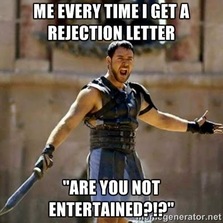|
by C J Bahr It's party time over at Long and Short Reviews. They are celebrating their 8th anniversary, with great content and giveaways. Walking Through Fire is participating. Pop on over for your chance to win prizes such as Amazon gift cards, publisher's Galley Copies, Books, eBooks, and author swag. There will be dozens of winners. #LASR_Anniv
by Rebecca Hendershot I had an order for these posts, and it was a good order. Then, I decided I would go ahead and submit stories. At which point I found I absolutely, positively, adverbly had to share with you guys what this experience was like for me.  How do you decide where to submit? Do they pay? Do they take my genre? What is the genre of this story? What if they don’t like it? Do they accept multiple or simultaneous submissions? My first story is on its third publisher. One rejection was very personalized and positive with reader commentary. Another was personalized enough to include my name and my story's title. This one sent an email acknowledgment with a personal response to my cover letter. Not every place gives you a critique (thank you to the editors that do!), but definitely note what they say. The other piece went to a different magazine, it’s flash fiction. Lots of the magazines these days accept online, some include status tracking. Like UPS. Roughly half, or more, of the places I’ve considered sending stories to use it. Almost all publishers want it as an attached file.  I have one other, but it took me a while to determine what genre it fit into. What can I recommend? Research the markets to exhaustion. Writer’s Market used to be the end all, be all, of how to find a publisher or an agent. Perhaps, for novels, they still are. Query Tracker is another great source for agents and publishers. Cheat mode: do enough google searches and you’ll find every magazine of every genre and every age, plus most have websites with submission guidelines. If you learn which editors want what, you’re more likely to get acceptance, or at the least, pleasant rejections.  Learn to write a cover letter. Editors will list on their sites their recommendations, it’s important. Some want short and plain; some want longer and more personalized. Did you proofread? Run the spell checker. Now read your story for errors it won’t catch. Did you know there is one space between a period and the start of a new sentence? Thanks, Mrs Something from grade school, but they changed the rules. Learn to format. Learn to read every detail of the publishers preferred format. Go look at Proper Manuscript Format. Some will tell you this is all they will look at, and others will throw this out the window. I learned it the hard way, then got a program that does it automatically for me. I always check over the compiled result and make sure it fits the criteria.  If I’ve learned anything on my journey and the people in it, I should be ready to wall-paper my room in rejection slips. I also learned it is possible to run screaming around the house with my phone held over my head because I got a good rejection letter. When editors add a positive encouragement it gives us a little more belief in ourselves. There are a variety of rejection letters, this article being the one I found the most helpful. Did you know you can actually reply to a rejection letter? The article by Nathaniel Tower gives some advice on how to respond to each type. My last thoughts on submissions are the same as everyone else, “Don’t give up.” Self-publishing is a viable option now if an editor won’t take your work. Editors Won’t Buy This, is my working title for the anthology of no-sells. Everyone gets rejected. Do your best, do your homework, and put cayenne on your fingernails.
|
AuthorAlways looking for a little magic, CJ decided to create some of her own as a writer of paranormal romance, urban and contemporary fantasy. Archives
May 2023
Interesting
|


